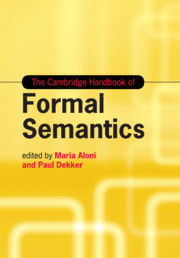Book contents
- Frontmatter
- Contents
- List of figures
- List of tables
- List of contributors
- Preface
- Part I The landscape of formal semantics
- Part II Theory of reference and quantification
- Part III Temporal and aspectual ontology and other semantic structures
- Part IV Intensionality and force
- 16 Negation
- 17 Conditionals
- 18 Modality
- 19 Questions
- 20 Imperatives
- Part V The interfaces
- Bibliography
- Index
18 - Modality
from Part IV - Intensionality and force
Published online by Cambridge University Press: 05 July 2016
- Frontmatter
- Contents
- List of figures
- List of tables
- List of contributors
- Preface
- Part I The landscape of formal semantics
- Part II Theory of reference and quantification
- Part III Temporal and aspectual ontology and other semantic structures
- Part IV Intensionality and force
- 16 Negation
- 17 Conditionals
- 18 Modality
- 19 Questions
- 20 Imperatives
- Part V The interfaces
- Bibliography
- Index
Summary
Introduction
There are an infinite number of ways the world could have been. For example, my first name happens to be Lisa, butmy parents could have named me Super Princess Lisa Superhero Easter Bunny. Another way to say this is there are some possible worlds (Lewis, 1973) where my name is Super Princess Lisa Superhero Easter Bunny. Natural language allows us to say all kinds of things about these possible worlds – such as My parents should have named me Super Princess Lisa Superhero Easter Bunny, or If my parents had named me Super Princess Lisa Superhero Easter Bunny, I would have been angry at them. The ability to talk about possible worlds is known as modal displacement (von Fintel and Gillies, 2011, who follow Hockett's (1960) discussion of temporal and spatial displacement).
Modal displacement is, as far as we know, unique to human language, universal to all languages, and acquired early. English-acquiring two-yearolds freely talk about what is permitted, obligated, or compatible with someone's abilities; they say things like you can't get it till it's Mother's Day, he just can borrow him, or you have to be quiet so she can sleep, and we expect that speakers of all languages (even those under-represented on YouTube) can similarly talk about permission, obligation, and ability.
Interestingly, however, languages also vary in how they express and categorize modal meanings. Unlike in English, in the Salish language St'át'imcets (Lillooet) the same morpheme (the enclitic =ka) can express either permission or obligation, as in (1). A different morpheme (the circumfix ka- … -a) is used to express ability, as in (2).
- Type
- Chapter
- Information
- The Cambridge Handbook of Formal Semantics , pp. 525 - 559Publisher: Cambridge University PressPrint publication year: 2016
- 4
- Cited by



